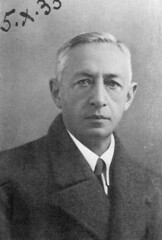 On November ninth, very far from here in a poor country house in an old Provencal town, I received the telephone call that informed me of the choice of the Swedish Academy. I would not be honest if I told you, as one does in such cases, that it was the profoundest emotional moment of my life. A great philosopher has said that even the most vehement feelings of joy hardly count in comparison with those which provoke sorrow. I do not wish to strike a note of sadness at this dinner, which I shall forever remember, but let me say nonetheless that in the course of the past fifteen years my sorrows have far exceeded my joys. And not all of those sorrows have been personal — far from it. But I can certainly say that in my entire literary life no other event has given me so much legitimate satisfaction as that little technical miracle, the telephone call from Stockholm to Grasse. The prize established by your great countryman, Alfred Nobel, is still the highest reward that can crown the work of a writer. Ambitious like most men and all writers, I was extremely proud to receive that reward at the hands of the most competent and impartial of juries, and be assured, gentlemen of the Academy, I was also extremely grateful. But I should have proved a paltry egotist if on that ninth of November I had thought only of myself. Overwhelmed by the congratulations and telegrams that began to flood me, I thought in the solitude and silence of night about the profound meaning in the choice of the Swedish Academy. For the first time since the founding of the Nobel Prize you have awarded it to an exile. Who am I in truth? An exile enjoying the hospitality of France, to whom I likewise owe an eternal debt of gratitude. But, gentlemen of the Academy, let me say that irrespective of my person and my work your choice in itself is a gesture of great beauty. It is necessary that there should be centres of absolute independence in the world. No doubt, all differences of opinion, of philosophical and religious creeds, are represented around this table. But we are united by one truth, the freedom of thought and conscience; to this freedom we owe civilization. For us writers, especially, freedom is a dogma and an axiom. Your choice, gentlemen of the Academy, has proved once more that in Sweden the love of liberty is truly a national cult.
On November ninth, very far from here in a poor country house in an old Provencal town, I received the telephone call that informed me of the choice of the Swedish Academy. I would not be honest if I told you, as one does in such cases, that it was the profoundest emotional moment of my life. A great philosopher has said that even the most vehement feelings of joy hardly count in comparison with those which provoke sorrow. I do not wish to strike a note of sadness at this dinner, which I shall forever remember, but let me say nonetheless that in the course of the past fifteen years my sorrows have far exceeded my joys. And not all of those sorrows have been personal — far from it. But I can certainly say that in my entire literary life no other event has given me so much legitimate satisfaction as that little technical miracle, the telephone call from Stockholm to Grasse. The prize established by your great countryman, Alfred Nobel, is still the highest reward that can crown the work of a writer. Ambitious like most men and all writers, I was extremely proud to receive that reward at the hands of the most competent and impartial of juries, and be assured, gentlemen of the Academy, I was also extremely grateful. But I should have proved a paltry egotist if on that ninth of November I had thought only of myself. Overwhelmed by the congratulations and telegrams that began to flood me, I thought in the solitude and silence of night about the profound meaning in the choice of the Swedish Academy. For the first time since the founding of the Nobel Prize you have awarded it to an exile. Who am I in truth? An exile enjoying the hospitality of France, to whom I likewise owe an eternal debt of gratitude. But, gentlemen of the Academy, let me say that irrespective of my person and my work your choice in itself is a gesture of great beauty. It is necessary that there should be centres of absolute independence in the world. No doubt, all differences of opinion, of philosophical and religious creeds, are represented around this table. But we are united by one truth, the freedom of thought and conscience; to this freedom we owe civilization. For us writers, especially, freedom is a dogma and an axiom. Your choice, gentlemen of the Academy, has proved once more that in Sweden the love of liberty is truly a national cult.
Finally, a few words to end this short speech: my admiration for your royal family, your country, your people, your literature, does not date from this day alone. Love of letters and learning has been a tradition with the royal house of Sweden as with your entire noble nation. Founded by an illustrious soldier, the Swedish dynasty is one of the most glorious in the world. May His Majesty the King, the chivalrous King of a chivalrous people, permit a stranger, a free writer honoured by the Swedish Academy, to express to him these sentiments of profound respect and deep emotion.
10/12/1933
